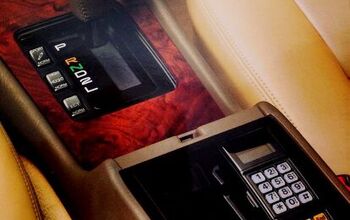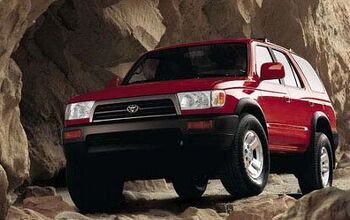Piston Slap: New Life for Old Tooling… Or Not?

TTAC commentator Halftruth asks:
Hey Sajeev,
This question came across my mind recently whilst reading all of the sedan death watch articles on TTAC. What happens to all the tooling and hardware when a model is discontinued/killed off? Can any of this stuff be recycled/redeployed?
Consider the Chryco 200, discontinued after 2 years. Will FCA mothball that stuff or throw it out or… something else?
Sajeev answers:
Finding relevant, concrete facts is challenging, so remember vehicle tooling eventually wears out. Especially for consumer touch points like body parts: perfect panel gaps are paramount to a ( perceived?) quality product. Don’t be surprised if vehicles that remain unchanged for years (a la 2009-present Toyota 4Runner) go through multiple sets of tooling.
And when the tooling fails to make the cut (so to speak), I reckon most is destroyed. First World manufacturers now refrain from selling sloppy seconds to their Third World counterparts, preferring the role of global manufacturers doing their thang in everyone’s backyard.
Redeployment? Yes, imagining the modern equivalent of the Vauxhall Victor reincarnated on a new continent is a romantic notion I’d love to indulge. Wouldn’t it be awesome if the durable, simple and strong Crown Vic became the next masala-infused Muscle car?
But that’s no longer viable. And if a cruise ship is worth 5+ million in scrap, assuming a financially significant value for vehicle’s collective tooling is far from insane. So what of the Chrysler 200’s tooling?
It’s probably off to the scrappers, if it hasn’t already turned into new tooling!
What say you, Best and Brightest?
[Image: Shutterstock user Zapp2Photo]
Send your queries to sajeev@thetruthaboutcars.com. Spare no details and ask for a speedy resolution if you’re in a hurry…but be realistic, and use your make/model specific forums instead of TTAC for more timely advice.

More by Sajeev Mehta
Latest Car Reviews
Read moreLatest Product Reviews
Read moreRecent Comments
- TheEndlessEnigma I would mandate the elimination of all autonomous driving tech in automobiles. And specifically for GM....sorry....gm....I would mandate On Star be offered as an option only.Not quite the question you asked but.....you asked.
- MaintenanceCosts There's not a lot of meat to this (or to an argument in the opposite direction) without some data comparing the respective frequency of "good" activations that prevent a collision and false alarms. The studies I see show between 25% and 40% reduction in rear-end crashes where AEB is installed, so we have one side of that equation, but there doesn't seem to be much if any data out there on the frequency of false activations, especially false activations that cause a collision.
- Zerocred Automatic emergency braking scared the hell out of me. I was coming up on a line of stopped cars that the Jeep (Grand Cherokee) thought was too fast and it blared out an incredibly loud warbling sound while applying the brakes. I had the car under control and wasn’t in danger of hitting anything. It was one of those ‘wtf just happened’ moments.I like adaptive cruise control, the backup camera and the warning about approaching emergency vehicles. I’m ambivalent about rear cross traffic alert and all the different tones if it thinks I’m too close to anything. I turned off lane keep assist, auto start-stop, emergency backup stop. The Jeep also has automatic parking (parallel and back in), which I’ve never used.
- MaintenanceCosts Mandatory speed limiters.Flame away - I'm well aware this is the most unpopular opinion on the internet - but the overwhelming majority of the driving population has not proven itself even close to capable of managing unlimited vehicles, and it's time to start dealing with it.Three important mitigations have to be in place:(1) They give 10 mph grace on non-limited-access roads and 15-20 on limited-access roads. The goal is not exact compliance but stopping extreme speeding.(2) They work entirely locally, except for downloading speed limit data for large map segments (too large to identify with any precision where the driver is). Neither location nor speed data is ever uploaded.(3) They don't enforce on private property, only on public roadways. Race your track cars to your heart's content.
- GIJOOOE Anyone who thinks that sleazbag used car dealers no longer exist in America has obviously never been in the military. Doesn’t matter what branch nor assigned duty station, just drive within a few miles of a military base and you’ll see more sleazbags selling used cars than you can imagine. So glad I never fell for their scams, but there are literally tens of thousands of soldiers/sailors/Marines/airmen who have been sold a pos car on a 25% interest rate.


































Comments
Join the conversation
Here's my naive question. What happens to all the cars that *don't* get sold? I've always wondered where the last few 2016s, for example, go.
Seeing the better part of a brand-new Hyundai Sonata unit body protruding from a dumpster out behind the Montgomery assembly plant in 2008 really put the economics of auto production into perspective for me. To quote Homer Simpson's long-lost half brother, "There's maybe forty bucks of steel in there". I'm guessing that well-used tooling is similarly discounted to mere salvage values.